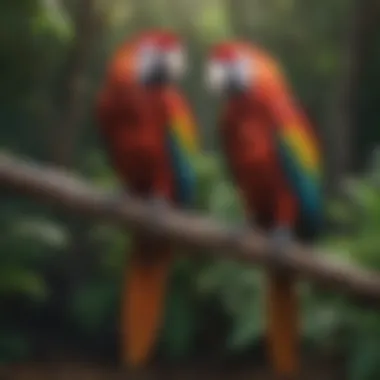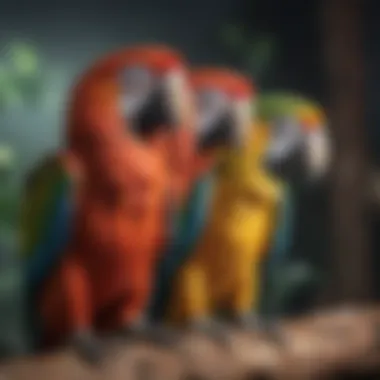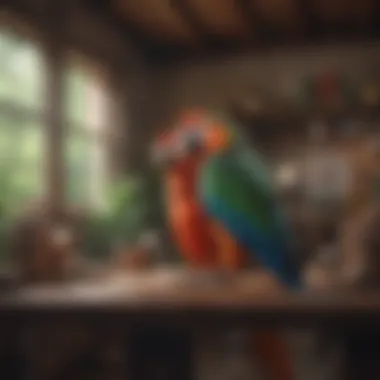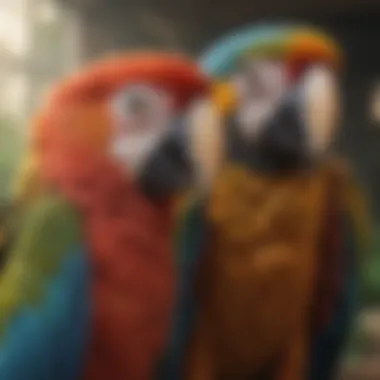Understanding the Price Factors of Macaw Parrots


Intro
The price of a macaw parrot can vary significantly based on an array of factors. Potential owners often underappreciate the complexities involved in selecting a macaw, pricing itself beeing just one aspect of a much larger puzzle. Understanding the added variables, from species variety to age and fierce market dynamics, helps aspiring bird parents navigate the purchasing decision. Winners in the game of avian companionship are those who balance eagerness to welcome a feathered friend with due diligence about all that ownership entails.
Care Tips
Daily Care Routines
When integrating a macaw into your life, consider a consistent daily care routine. Regular feeding is crucial. Feed your macaw a balanced diet, along with ample fresh fruits and veggies each day. Interactions, such as talking or gentle playing, should also occupy significant time daily, building a bond between you and your macaw.
Cage Setup and Maintenance
The proper cage setup plays a critical role in a macaw’s wellbeing. Choose a spacious, sturdy cage that allows your macaw to move freely. Dimensions are paramount—macaws are large birds and require sufficient space. Inspect and clean the cage regularly to prevent health issues that arise from accumulated waste.
Hygiene and Cleaning Practices
Good hygiene cannot be overstated. Dirty living conditions can lead to illness in your bird. Clean feeding dishes, fresh water, and toys are essential practices to keep in mind. Use non-toxic cleaners and regularly check for any signs of wear or damage suffered by items in the cage.
Seasonal Care Adjustments
Changes in seasons often necessitate adjustments to care routines. During colder months, protect your macaw from drafts or extreme temperatures. Provide ample physical activity indoors if outdoor play becomes limited. Understanding these seasonal effects ensures long-term health.
Behavioral Insights
Understanding Bird Body Language
A macaw uses body language to communicate feelings or readiness—tall feathers may signify excitement or curiosity, while closed wings might indicate fear or defensiveness. Paying attention to such cues will help you foster trust and understanding.
Common Behavioral Issues and Solutions
Understanding behavioral issues can greatly enhance the relationship with your macaw. Redirect attention during problematic situations or provide designated toys and calming zones. Tackling these issues with patience rather than frustration can yield more positive outcomes.
Positive Reinforcement Techniques
Macaws respond well to training strategies focusing on positive reinforcement. Reward desired behaviors with treats and praise to cultivate good habits. Consistency is key, resulting in a trusting, engaging relationship through repeated positive interactions.
Social Interaction Needs
Macaws are inherently social creatures. They thrive on companionship and stimulation. Apart from interacting with their humans, consider integrating playdates with other avian friends to enhance emotional and social wellbeing.
Nutrition Guides
Essential Diet Components
A macaw’s diet must be diverse and include high-quality pellets, various seeds, nuts, fruits such as mango and papaya, and leafy greens. Enriching their diet is essential for a happy and wholesome life.
Safe and Toxic Foods
Familiarize yourself with the list of toxic foods. Certain foods should strictly be avoided including chocolate, avocados, and caffeine. Knowledge of what not to feed adds an essential layer to macaw ownership.
Supplements and Treats
There are various available supplements that can support general health and well-being in macaws. Discuss appropriate options with a qualified avian veterinarian who will tailor suggestions specific to your bird’s age and condition.
Feeding Strategies for Different Species
Different macaw species might require slightly varying dietary approaches. For example, the Blue-and-yellow Macaw may need a higher fat content in their diet compared to the Severe Macaw. Therefore, research specific needs as closely as possible.
Wellness and Health
Routine Health Checkups
Regular health checkups are vital to ensure ongoing wellness. Schedule consultations with an experienced avian vet who is familiar with the specific requirements of macaws.
Identifying Symptoms of Illness
Being able to recognize symptoms of illness can save a life. Look for changes in behavior such as reduced activity or unusual droppings. Immediate vet attention can lead to improved outcomes.
Preventative Care and Vaccinations


Vaccinations bolster health, guarding against common avian diseases. Here, preventative care can sometimes detect health issues before they become severe, therefore enriching macaws' longevity and quality of life.
Mental and Emotional Well-being
The mental state of your macaw is intricate. Offer mental stimulation through toys and regular interaction to distinguish boredom and enhance their happiness. This care translates into a more fulfilling life for your macaw.
Enriching Activities
Toys and Playtime Ideas
Interactive toys can relieve a destructive behavior through other beneficial engagement techniques. Use a what suits your macaw's preferences draw you with various creative toys.
Training and Tricks
Engaging your macaw in training can be a joyous yet essential learning venture. Teach basic commands using high-value treats will not only engage but also improve your relationship.
Outdoor Activities and Interaction
Take your macaw outdoors securely. Leashes or transportable cages can offer great interaction and extensive exploration which meet their social needs securely.
DIY Projects for Mental Stimulation
Constructing simple DIY projects can be very fulfilling both for you and your macaw. Safe, homemade toys or search up ways for mental challenges further enhance their intelligence while fostering enrichment in routines.
Given the intrinsic complexities of chose a macaw parrot, investing time in understanding their nuanced needs proves to be indispensable. The richer the experience for your macaw, the greater reward you shall receive in lifelong companionship.
Factors Influencing the Price
Understanding the factors that influence the price of macaw parrots is vital for anyone contemplating acquiring one. These parrots are not cheap pets and the initial cost can vary immensely based on several components. Buyers must consider different species, their age, regional factors, and the reputation of breeders. Each of these elements play a significant role in determining the final price, helping potential owners to do thorough market comparison and budgeting.
Species Variability
Popular Macaw Species
Popular macaw species include the Blue and Gold Macaw and the Scarlet Macaw. These birds are widely favored for their vibrant colors and friendly disposition. Their popularity means that they are easily found in avian stores and are more likely to come from reputable breeders aiming to maintain their good standing. The traits that make them appealing also contribute to their higher price point in the market. Well-socialized birds tend to cost more, yet they offer a satisfying bond with owners.
Some might also consider the health history and lineage when choosing popular macaw species to purchase. A clear health record can prevent significant expenses down the line.
Rare Species Pricing
Rare macaw species like the Hyacinth Macaw have prices that can surge beyond typical models due to their scarcity in the marketplace. Their exotic nature and stunning beauty imply that they are often in high demand amongst collectors and enthusiasts, which raises their pricing bracket. However, potential owners must assess their ability to meet the specialized care requirements these rare species need. Furthermore, such species can sometimes pose challenges in socializing due to their more reserved natures in comparison to their common relatives.
Age of the Macaw
Juvenile vs Adult Pricing
The age of macaws also plays a fundamental role in pricing. Juvenile macaws tend to be less expensive than adults as they require new homes and training to adapt. This age segment gives new owners an opportunity to shape the bird’s personality. However, younger birds also demand considerable time and patience to train and socialize appropriately. Conversely, adult macaws often come with a higher price tag due to established socialization and personality traits that a buyer can assess beforehand. They may also have pre-determined health backgrounds known by the breeder enhancing peace of mind for the new owner.
Long-term Commitment
Purchasing a macaw is not merely about the initial cost; it is about a long-term commitment. Macaws can live over fifty years. Potential owners must think through the implications that they will be financially bound for many years. This involves when planning for future veterinary needs, dietary concerns, and general care expenses. Understanding commitment on this level helps new owners adopt in a responsible manner and avoid regrettable purchases late due to underpreparedness.
Location and Availability
Regional Price Differences
The location from which someone purchases their macaw can see significant price differences. Urban areas may feature higher pricing due to an increased demand and nearby availability possibly offering supply-related costs. In contrast, breeders located in rural areas rhe opposite might show reduced pricing that prevails less demand. Knowing such discrepancies can widen one's search and possibly result in lower purchase prices.
Availability of Breeders
The availability of reputable breeders is another layer affecting the price. Regions that have many responsible breeders tend to create competitive pricing which can benefit buyers. If one lives where fewer accredited breeders exist, it may become problematic regarding price as competition would largely diminish. Hence, identifying breeders and being aware of which have solid reputations is crucial in ensuring fair pricing and proxy contract.
Reputation of Breeders
Certified Breeders
Buying from certified breeders offers a level of assurance that the materials needed for breeding are of excellent quality. Yearly follow-ups or required environmental standards sustains that such birds are well-cared for, raising your chances of acquiring a healthier pet. Nevertheless, the prices from these professionals reflect their higher expenses incurred during proper breeding and room treatments. Despite entering a price-freezzing industry, many find it benificial for piece of mind, health justification, and intrinsic values.
Backyard Breeders
On the contrary, backyard breeders may offer lower costs, positioning themselves as appealing from an initial financial standpoint. These individuals, however, often populate the market without rigorous attention to health or inbreeding issues. No reputational checks may be enforced, risking hidden long-term health expenses. Although cheaper, securing birds from these sources can provingly complicated considering potential living cost-cutting leading the eventual caregiver on a hopeless receipt in the end - high price flying only or transferring unwanted traits.


Understanding the nuances of prices associated with your macaw selection is essential in making an informed choice. Carefully weighing all options enables you to ensure your investment in a companion lasts far beyond the shop.
Initial Purchase Costs
Initial purchase costs are a primary consideration when thinking about macaw ownership. These figures are the first financial hurdle potential owners must manage, setting the stage for future expenses. Understanding these costs helps in planning and confirming if ownership aligns with one's financial landscape.
Average Pricing Range
The average pricing of a macaw parrot can vary significantly based on several factors. Generally, individuals can expect to spend anywhere from $1,000 to $4,000.
- Common Species: Popular breeds, such as the blue-and-gold or green-wing macaw, tend to be on the lower end of this spectrum.
- Rare Species: Lesser-known types can cost much more. A hyacinth macaw, for example, might be priced between $10,000 and $12,000 due to their rarity and demand.
This wide pricing range reflects the influence of species, breeder quality, and even geographic location. Applicants looking into macaw acquisition must recognize these variables clearly as part of their financial planning.
Online vs Local Purchases
When deciding where to buy a macaw, the choice between online and local purchases must be carefully weighed. Here are some points to consider:
- Local Facilities: Visiting local pet shops or breeders allow potential owners to see the macaws in person. You can check the environment in which the birds live, gauge their health, and ask questions directly.
- Online Transactions: While online sources can provide a broader selection, potential buyers should vigilantly research the seller's reputation. Examples of well-known platforms include specialized websites. Nonetheless, physical inspection of a macaw before purchase is advisable when possible.
Both options necessarily come with unique risks and benefits. The final decision should be made based on personal comfort levels, experiences, and specific preferences around hands-on interaction.
Potential Discounts and Deals
Finding deals or discounts rarely comes into mind when interested in macaws. However, these opportunities do exist in some contexts:
- Adoption Fees: Some shelters promote rehoming. These processes often are more wallet-friendly and serve welfare purposes if you're open to adopting a macaw rather than purchasing from a breeder.
- Seasonal Promotions: Certain aviaries or breeders may advertise sales or special incentives periodically, contributing to potential financial savings. Keeping an eye on local bird fairs may provide access to affordable prices or sales.
Overall, saving during initial macaw acquisition is conceivable, given thorough research and attentive scrutiny. Proper due diligence is vital in this exciting endeavor of becoming a macaw owner.
Ongoing Costs of Ownership
Understanding the ongoing costs of owning a macaw parrot is crucial for prospective owners. While the initial price of purchasing a macaw can be substantial, it's essential to recognize that the long-term financial commitment will significantly impact your life, both emotionally and financially. This section delves into the various ongoing expenses associated with macaw ownership, providing valuable insights that will guide potential buyers in making an informed decision.
Food and Nutrition
Basic Diet Costs
The basic diet for a macaw includes pelleted food, seeds, fresh fruits, and vegetables. Each macaw has unique nutrition requirements, and it's crucial to provide them with a balanced diet to ensure their health. The costs can vary considerably based on the type of food and brand. High-quality pellets might average $30 to $60 per month, ensuring that your parrot receives essential nutrients. Investing in nutritious and quality food may seem expensive but enhances the health and happiness of your parrot over the years.
Special Dietary Needs
special dietary needs can arise if your macaw has specific health issues or preferences, making tailored food essential. For instance, a macaw with a deficiency might need more nutrient-rich foods, leading to additional costs. The pricing for supplements or specially formulated diets can range from $15 to $50 monthly, depending on requirements. These dietary adjustments help in preventing health problems and ensuring your bird thrives, reflecting a responsible commitment.
Housing Expenses
Cage Costs
Proper housing is vital for a macaw's well-being. The type and size of the cage directly influence its comfort and safety. Expect to budget from $150 to $800, depending on size and materials. Going for a sturdier cage can seem expensive initially but ensures durability and a safe environment for your macaw for many years. A well-chosen cage can provide not only safety but also enriches your parrot's quality of life by allowing it space to move and play.
Environmental Enrichment
Creating a stimulating environment for a macaw is important. Environmental enrichment can include toys, branches, or climbing structures. These additions can cost between $50 to $100 annually. Regular updates or replacements of items keep your macaw engaged, ultimately leading to a healthier mental state and preventing behavioral issues. Investing in creative enrichment tools acts as a preventive measure against boredom-related compulsive behaviors.
Healthcare and Veterinary Costs
Routine Care Expenses
Routine veterinary visits are an integral part of macaw ownership. Routine care costs can average between $100 to $300 annually. Such visits help prevent health issues before they arise and contribute meaningfully to a long-term healthy life. A proactive approach to routine care makes a significant difference in general wellbeing and reduces the overall healthcare burden in the future.
Emergency Care Considerations
Emergencies can happen; hence budgeting for unexpected medical expenses is smart. Potential costs can escalate quickly during emergencies, typically ranging from a few hundred dollars to $1,000 or more, depending on the urgency and treatments required. While the expense can be high, having a financial reserve for emergencies can protect both the macaw and the owner from dilemmas around urgent healthcare needs. Being prepared helps manage pressure during unforeseen situations.
Miscellaneous Costs
Toys and Accessories
Toys significantly contribute to a macaw's life quality. Providing varied toys helps alleviate boredom and offers mental stimulation. Costs for toys and accessories might run from $50 to $150 each year. Such a budget becomes essential for responsible ownership, reflecting a commitment to keeping your macaw mentally engaged and happy throughout its life.


Grooming Supplies
Grooming is another aspect of maintenance that should not be overlooked. Products like nail clippers or bird-safe shampoo contribute to the overall health and happiness of your parrot. The average annual costs for grooming supplies can total around $30 to $60. Regular grooming not only improves hygiene but also strengthens the bond between bird and owner, leading to a more fulfilling companionship.
Long-Term Financial Commitment
The long-term financial commitment of owning a macaw parrot is a crucial aspect that any potential owner must consider. A macaw's lifespan can range from 30 to 50 years, necessitating substantial planning for finances, care, and wellbeing throughout this time. Macaws require not only an initial investment but also ongoing expenses that can accumulate significantly over the years. This section elaborates on the essential considerations and elements linked to long-term financial obligations associated with these birds.
Lifespan Considerations
Financial Planning for Lifespan
Financial planning for the lifespan of a macaw is an all-encompassing strategy aimed at ensuring the owner's financial stability and the bird's welfare throughout its life. This aspect emphasizes not just the initial cost, like purchase price and habitat setup, but also the regular expenses for food, care, and potential emergencies. The longevity of macaws means owners must integrate household economic planning with veterinary care budgets over an extended period. Owning a macaw translates to a lifelong financial responsibility; thus, clear understanding and foresight can substantially reduce unforeseen financial strain on future owners.
Here are some key characteristics of strategic financial planning for macaw lifespan:
- Consistency: Stabilizing funds strive to anticipate costs regarding diets, living spaces, and health care.
- Flexibility: Adjustment in planning is necessary based on unexpected veterinary bills, adopting a healthy lifestyle for the bird to mitigate future expenses.
The main advantage of such planning is it inspires a steady flow of resources allocated just for the bird's journey through life. However, it demands discipline and understanding of finances to be effective.
Budgeting Techniques
Budgeting techniques serve as practical methods for managing financial resources wisely for a macaw. Using precise budgeting can further support an owner’s large-scale approach to their pet’s needs. By recognizing and categorizing expenses into categories, like food, housing, and healthcare, owners can clarity towards their overall commitment.
These budgeting methods promote:
- Organized Tracking: Pinpointing disclosed expenses specific to macaw needs makes revisability through financial circumstances easier.
- Preparation: Alerts to hidden costs lead to advanced organization towards financing emergencies.
Utilizing budget techniques helps create a well-structured financial portfolio for macaw's owners. The only disadvantage can be the potential challenge for non-experienced individuals on accuracy, if not used effectively.
Insurance Options
Considering insurance options is highly recommended to safeguard against unpredictable expenses tied to health and emergency incidents. Insurance can provide peace of mind for macaw owners, shielding them from such overwhelming unforeseen costs. Various insurance policies exist that cover veterinary care and accidents, substantially easing financial burdens for owners when unpredictable scenarios arise.
Thus educating on proper options adds to an owner's competency and assures them that they don’t only cherish their companion but also secure their well-being during demanding situations. Pet insurance can offer various degrees of coverage, contingent on specific agreements, age, and breed; hence, thorough discussions with insurance providers prove advantageous in decision making.
Ethical Considerations in Pricing
Understanding the ethical implications connected to the price of macaw parrots is vital for making informed decisions as a potential owner. The expenses associated with acquiring and maintaining these birds can reflect deeper issues relating to sources and standards of care. It is critical to balance financial aspects with animal welfare and responsibilities.
The discussion on ethical considerations sheds light on the expected practices within the breeding and selling continuum. By being mindful of how these birds are commercially valued, buyers can ensure they support ethical practices while choosing a compatible companion.
Impact of Supply and Demand
Market dynamics significantly influence the price of macaw parrots. High demand can drive prices up, creating a potential profit surge for breeders. Unfortunately, this practice may encourage undesirable breeding methods to meet market needs quickly, compromising the health and welfare of the birds. The costs of these birds can be associated with their popularity among pet enthusiasts. Typically, popular macaw species see higher price tags due to their demand in the pet market. Moreover, rare species often appeal to collectors and are priced accordingly.
Working against the backdrop of supply and demand, several factors need consideration:
- Conservation Status: Owning a rare or endangered species often necessitates adherence to regulatory requirements, which can artificially inflate prices.
- Breeding Standards: Ethical breeders maintain high standards and ensure healthy macaws, which can reflect in their pricing structure.
It therefore becomes incumbent upon a buyer to research effectively. Knowing whether a breeder follows ethical practices aids in safeguarding the future environment of macaw ownership.
Responsibility of Ownership
Macaw ownership requires understanding the complexities beyond initial payment, extending to ethical responsibilities toward the bird’s lifetime. Individuals contemplating bringing a macaw into their homes must recognize this task not only involves affection but also concrete obligations to their welfare:
- Knowledge and Care: Raising macaws entails being informed about their dietary, psychological, and social needs. Proper care translates directly into tangible opportunities to improve overall macaw wellbeing despite initial costs.
- Long-term Financial Planning: Costs must be anticipated over the bird's lifespan, which can range from 30 to 80 years. Such budgets require realistic assessment and planning to avoid neglect in the future due to escalating expenses.
- Commitment to Rescue or Rehabilitation: Some new owners consider supporting rehoming or rescue options. Becoming aware of these channels provides more ethical avenues of acquiring a macaw, balancing the desire for a pet with social responsibility.
As potential owners approach purchasing decisions, it is beneficial to reflect carefully on the impact of pricing structures, and how they intertwine with the macaw’s overall wellbeing.
In summary, knowing the ethical factors involved in the pricing of macaw parrots establishes a responsible framework for potential pet owners. The intersection of supply and demand, alongside ownership responsibilities, shapes a buyer's choices while emphasizing the welfare of these smart companions overall.
Ending
Additionally, the age of the macaw plays a significant role. Juveniles might be less costly initially, however, the long-term attachment and care they require can result in higher ongoing expenses. The place where you buy your macaw matters as well; prices can vary markedly from one region to another, or between breeders.
Summary of Key Points
- Species: Pricing varies notably between common and rare species.
- Age: Juveniles generally cost less than adults but require much commitment.
- Breeder Reputation: Prices also reflect the reliability of the source, be it a certified breeder or not.
- Location: Regional disparities can show different price ranges.
- Ongoing Costs: Don't overlook the recurring costs of food, housing, and health care.
"Be mindful of the factors leading to macaw pricing as it aids one find the right bird that fits one's lifestyle and financial capability."
Informed Decision Making
Making an informed decision extends beyond the price tag. Evaluate your personal circumstances; do you have the time and resources for a significant commitment? Ignoring long-term expenses could lead to unexpected financial burdens. Research potential breeders thoroughly, including visiting their facilities, to assess the conditions of their birds.
Ultimately, choosing to bring a macaw into your home should stem from readiness to adopt not just a pet, but also a delicate bond that demands patience and respect. Reassessation viewpoint on ownership becomes vital in attaining the life you and your macaw will cherish. Consider factors such as their lifespan and resources needed, to cultivate a lasting relationship that is both fulfilling and loving.















